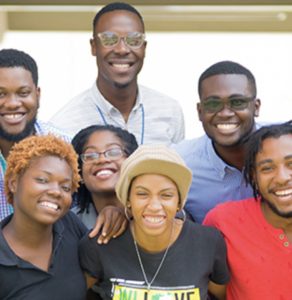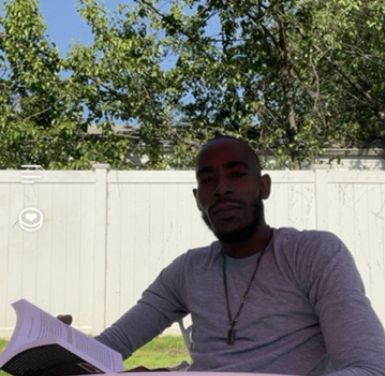Is there anything such as “Caribbean Thought”? Thought is not “dinosaur-ish” or static, as it is dynamic and critical. Therefore, we are looking at diverse currents in the Caribbean including its diaspora that has shaped the present Caribbean experience and consider a future. Hence what of Caribbean thinking and minds. What have Caribbean thinkers contributed to this world order and what are they saying now especially in this neoliberal world that has been penetrated by Trumpism, populism and this renewed sense of indifference and revival of fascism.

The special lectures in Caribbean and Pan-African Thought is delivered by Rev. Renaldo McKenzie (Prof.). The Lectures lead to an examination the students will have to sit to pass. The course and Lectures also aims to develop a Caribbean Thought Academic Journal.
 Image Excerpt Showing Students from the Jamaica Theological Seminary, Copied from www.jts.edu.jm
Image Excerpt Showing Students from the Jamaica Theological Seminary, Copied from www.jts.edu.jm————————————————————————————————————-
This course will benefit the text book: “Neoliberalism, Globalization, Income Inequality, Poverty and Resistance and Neoliberal Globalization Reconsidered”. We will delve into the socio-political economy of the Caribbean and explore opportunities for development and growth, such as the advancements in science, digital technology and social media.
What are your thoughts on the idea of “Caribbean thinking” and how effective and #influencial is this thinking in shaping not just Caribbean life but life in the diaspora? What #contributions or #impact have thinkers of Caribbean thought impressed on past and current affairs on the #globalstage and will it bear any relevance for tomorrow given this regions level of #economicdependence. The course will be taught online via Ring Central/Zoom. You may Email the Professor, Rev. Renaldo C. McKenzie for a link invitation to view live lectures and recorded videos and Lecture materials.
About the Lecturer

Rev. Renaldo C. McKenzie, was born in Jamaica and graduated from Jamaica Theological Seminary, ordained to the Ministry of Sacrament and Word in the United Church, and after Studying Philosophy briefly at the University of the West Indies, went on to the University of Pennsylvania. where he graduated with a Master of Arts and a Master of Philosophy. He is currently a US Citizen, residing in Philadelphia Pennsylvania and is Author of Neoliberalism, Globalization, Income Inequality, Poverty and Resistance an academic text which was number one on Amazon in Deconstructivist History and Critical Philosophy. The book was reviewed as an erudite analysis of Jamaica’s economic history by Kirkus Reviews. Renaldo’s second academic book, Neoliberal Globalization will be released February 2023 which features contributions from Professor Emeritus, Martin Oppenheimer, Ph.D. of University of Penn and Rutgers University and author of several ground-breaking books. Renaldo is a Doctoral Candidate at Georgetown University and Creator/Host of The Neoliberal Round Podcast, a global podcast in News Commentary that is top five worldwide in News Commentary. Renaldo is also President of The Neoliberal Corporation a think tank and Digital Media company…
Latest Lecture:
A Special Lecture Marking Black History Month: Lecture 6: The Caribbean as Part of Black Americas History: From Arawak to Africans.
Caribbean and Pan African Thought Lecture Series by Prof. Renaldo McKenzie
Here’s some Past Lectures:
- Caribbean Thought January to May 2023 semester 2: Subscribe on YouTube to access semester 2, 2023 Lectures
- Lecture Three, January 27, 2023: Caribbean Thought Week 3: Conceptualizing Caribbean Thought – when we study and reflect on Caribbean Thought, including diverse currents that have shaped its present that speaks to a future, how far must we go back? Where must we start?
We examined the processes of Colonization from the perspective of Fanon who defines colonization as involving a violence of depersonalization – stripping away the individual.
We provided an academic answer/response to the question: Are “White-Collar in Jamaica a Crimes a result of Colonization”? And why are crime rates so high in places like Trinidad and Tobago and Jamaica? We suggested a Marxist materialist reply – “Relative Deprivation”. What is Relative deprivation? We defined it as the correlation between high crime and high poverty and income inequality. Jamaica and the Caribbean suffers from high poverty and inequality correlated with the highest crime rates in the Caribbean. This is commensurate with what is happening is black and brown communities all over the world – hence supporting the conclusion/analysis of “relative deprivation”.
We pointed out that to study Caribbean Thought is to do philosophical inquiry which involves logic and reason and an understanding of Descartes phenomenology, who coined “cogito ergo sum – I think therefore I am. He recognized the subjectivity of reality outside of objective verification. Further, we pushed the exploration of knowledge by discussing Kant who says that history is a result of human nature and circumstances, and questions Newtonian Physics which formed the basis of western civilization’s understanding of reality. The Caribbean as part of a reality of western civilization is influenced by that bent.
We reviewed the economic history of western society and capitalism stating that it is within a system that has impoverished or weakened the Caribbean States. We revisited Adam Smith Wealth of Nations and Max Weber Protestant Ethic and Spirit of Capitalism regarding the justification and economic principle behind Capitalism. However, we challenged the wealth of nations by invoking Karl Marx who critically re-examines Adam Smith’s Accumulation of Capital idea, saying that it was not one in hard work but theft and violence. This then led us to consider the socio-economic and political interests of the Caribbean such as Michael Manley and Fidel Castro who were Nationalists influenced by Marxists critique of capitalism and his idea of Communism. Caribbean Political and literary thinkers were off-center and regarded as Democratic Socialists which had threatened American domination and penetration in the region to what they had believed was given way to socialist ideology.
However, there are those who sided with the former masters who opposed the local socialists’ nationalists, such as Edward Seaga, regarded as the promoter of Reaganomics in the Caribbean. This tension between Michael Manley and Edward Seaga represented one of the most defining periods in Jamaica’s history, much like other countries in the Caribbean that suffered the same violent political fate, where Seaga, American Capitalism and Manley, Democratic Socialist, embodied the global tensions between the East and West. This has helped to exacerbate Jamaica’s problems of gang violence. Political corruption and the debt burden has deepened Jamaica’s economic outlook and globalization has not guaranteed any prosperity but left Jamaica and the Caribbean vulnerable.
Yet we asked, is there a father of modern Caribbean economics?
Further, we explored solutions to the black position that is characteristic of the Caribbean peoples experienced, dense with a population of African descent, whatever that means. By looking at “Critical Race Theory” and what Black scholars such as Dana Berry White to re-invent and re-imagine the black and brown man. Moving from a Victim and defeatist approach to a hero approach, looking for the hero within the slave. Moreover, we challenged Edith Clarke and Rex Nettleford’s analysis of the Organizational Dynamics in some Jamaica rural communities. In “My mother who fathered me,” tried to explain their concubinage and illegitimacy as coming from an African heritage as if they know that Africans did not have family, a sense of monogamy and a structure. They provided an analysis learned from traditional sociology and functionalism that suggested that slaves were primitive and backward and that the behaviors of the Caribbean resemble and come from that. Yet the connections between cultures were disrupted and the idea of the individual became a dormant memory.
We concluded by discussing the reading assignment:“The #negro is not. Any more than the #whiteman,” Frantz Fanon, in “Black Skin White Masks,” #psychoanalysis of the “colonized” (systematically controlled) man/woman, he removes the dominant view within comparisons, striving for the empowered self. According to Homi Bhabha, here the familiar alignment of colonial [controlled] subjects is disturbed by a break, a pause from the usual to reveal a truly authentic self. Homi Bhabha [1], The Location of Culture on Fanon. In addition, his use of the period after not proceeding the capitalized A represents an interruption and a break in standards of language. Fanon is deliberate when he uses language that deviates from center, where the subject does not agree with verbs and punctuations are misplaced as a violent attack and rebellion against the status quo. That was one way he promoted violence, in his literary genius.
When we hear of Jamaica or the Caribbean, we think of beautiful islands of paradise with sun, sea and sand, reggae music, cannabis, and “irie” people like Usain Bolt- people who are living out their best dreams, desires, and lives. But this book analyzes this motif, given the historical and current economic and political situation in Jamaica and the Caribbean and the “Global South.” In an attempt to escape the adverse realities of poverty, inequality, and injustice, the people of the Global South find themselves in north metropolises with very little agency and minimal change to their lives. In fact, except for the use of cleaning neoliberal waste, the immigrant is usually portrayed as an alien with three heads and big sharp teeth seeking to steal and destroy the profit and disrupt society. As such we will discuss Black, brown, and Pan-African struggles for economic prosperity, justice, and freedom and consider efforts, abilities, or inabilities to chart their own futures since decolonization and realize real political independence and economic prosperity. Perhaps, they are charting their own course by the few corrupt members of the status quo who are benefiting from partnerships with the neoliberal regime of the “Washington Consensus,” advocates of the “bureaucratic phenomenon,” while the masses are left behind…” Neoliberalism…Renaldo McKenzie
[1] Homi Bhabha has an affinity in and was influenced by critical thinkers who were off-center and epic or revolutionary in their thinking which had left these literatures on the fringes of academia. But Homi Bhabha has placed them front and center revealing their epic prose and positions. In fact, it was V.S. Naipaul, the Trinidadian Novelist who fascinated him the most with his way of bringing to the front of his novels as main characters, those who never usually occupy such spotlight in Literature. But in Naipaul’s world, they do and such is the Caribbean, “little but talawa” an indubitable set of people who creatively shape what life they have in heroic fashion. This was the genius and iconoclasts of Naipaul who I have come to admire through the reading of Bhabha.
———————————————————————————————————————————————————————–
We developed three more questions from our reflections in light of our discussions today:
- How do you describe the socio-political economy of Jamaica and the Caribbean today?
- What apology can you provide to those who are pessimistic of change and hope believing that that’s the way it is.
- If the fallen can perceive anything better, what will upend violence?
Additional Resources and Activities for Personal Reflection.
———————————————————————————————————————————————–
Weekly Assignment:
- Meet in your groups, identify a question from the question sheet that you’d like to reflect on at class. (See Lecture Notes with the sheet on page 2) Answer the question using critical thinking skills: What is Critical Thinking? – The NeoLiberal Corporation
2, Identify an issue in the news and provide an academic reply using academic jargon and language or prose. Situate it within the understanding of Critical Thinking and skepticism. Read this article to help you: (74) Privilege, Power, Position and the Need for Critical Thinking | LinkedIn
- Read Chapter One of: Norman Girvan. Reinterpreting the Caribbean, in New Caribbean Thought – Google Books University of The West indies. 2001. Chapter 3, Pp. 3 -23.
[1] What will end #violence, if the human mind can conceive of anything better. Yet, the violence done to the controlled mind doubting any reality beyond a fallen state, incapacitates his drive for utopia so that we’re fated to our doom negative #eschatology. What will End Violence? Boys Need for Positive Influences And The Monterey Park Massacre – The NeoLiberal Corporation

